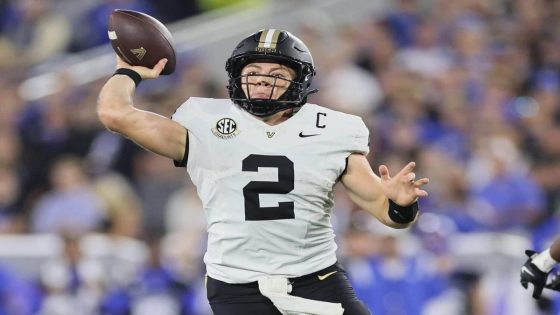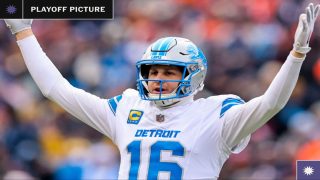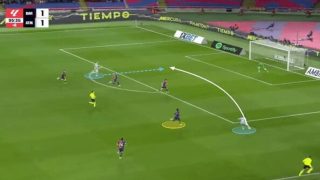Vanderbilt quarterback Diego Pavia has sued the NCAA, claiming rules that count junior college years toward NCAA eligibility are an antitrust violation and that he should have at least one more year of eligibility in 2025 — and potentially two — according to a copy of the complaint obtained by The Athletic.
Pavia, who played two years at New Mexico Military Institute before moving on to New Mexico State for two years and then Vanderbilt this year, argues in the complaint that the rule restricts the name, image and likeness earning ability of college athletes. The complaint asks the U.S. District Court in the Middle District of Tennessee to rule that the NCAA’s junior college bylaws are a violation of the Sherman Act and asks that Pavia be given two more years of NCAA ability to make up for the two years lost to match the four Division I years allowed.
“JUCO Eligibility Limitation Bylaws restrict the ability of athletes who begin their college football careers in junior colleges from having the same opportunity to profit from NIL as students who enter an NCAA institution as freshmen,” the complaint reads.
The NCAA did not immediately respond to a request for comment from The Athletic.
Vanderbilt is 6-3 this season behind Pavia, including the school’s first win against Alabama since 1984.
Pavia also asked the court for an expedited decision before the winter transfer portal window opens on Dec. 9.
“I would like to return to Vanderbilt next year, but need time to negotiate NIL deals before the transfer portal opens,” Pavia said in a statement through his attorneys. “If the transfer portal opens before I can complete negotiations with Anchor Impact (Vanderbilt’s collective), I will be trapped between abandoning those negotiations, or foregoing possible opportunities with other colleges who may recruit other quarterbacks out of the transfer portal before I can enter.”
Vanderbilt head coach Clark Lea also issued a statement of support in the press release, saying, “Diego is a strong leader and great player for the Vanderbilt program and I would love to have him back next year. However, I cannot leave the team and program in limbo while an extended process plays out for Diego. Unless and until Diego gets a court ruling in his favor, I must proceed with building a roster without him.”
The argument of restricting NIL earning ability is similar to the case made by several state attorneys general last year that ultimately led the NCAA to remove its one-year free transfer restriction earlier. It also led many in the industry to wonder when an athlete would sue over the NCAA limit of four years of eligibility in the first place. Pavia’s argument is instead more narrow, focusing on junior college rules and redshirt rules.
One of the arguments in the complaint is that junior colleges aren’t governed by the NCAA. They’re instead governed by the NJCAA, which has no affiliation. NCAA bylaws allow four years of eligibility over a five-year span, though exceptions are made like the COVID waiver and medical redshirts. The bylaws specifically mention two-year and four-year schools.
Junior colleges do allow players to earn NIL money. Pavia’s filing also cites athletes who played professionally in another sport and did not lose NCAA eligibility years, like former Florida State quarterback Chris Weinke.
“While junior colleges are not part of the NCAA monopoly and JUCO athletes have no meaningful opportunity to earn NIL Compensation, the NCAA still subtracts one season of NCAA Division I eligibility from an athlete for each year he/she competes at a junior college,” the complaint reads.
The chances of Pavia’s case being successful are unclear, but his lawyers hope for temporary relief as soon as possible and potentially a court hearing within the next few weeks. The NCAA has endured a recent losing streak in court over eligibility on anti-competitive grounds. The creation of NIL rules by states, later adopted by the NCAA, opened the door to these challenges against earning restrictions.
“Without application of the JUCO Eligibility Limitation Bylaws,” the complaint reads, “there would be tremendous demand amongst NCAA institutions seeking to compete for the services of Diego Pavia and similarly situated athletes for the 2025 football season.”





